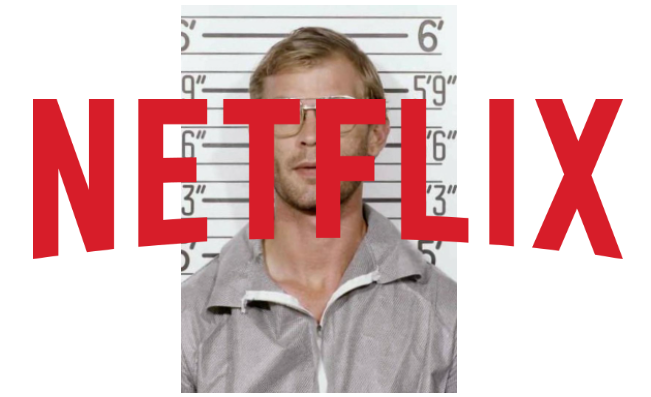Opinion | It’s not just the victims who are hurt — a dive into ‘Monster: The Jeffrey Dahmer Story’
October 28, 2022
True crime has always been popular in media, but there’s a difference between delivering information of a murder and portraying it creatively for entertainment. When companies such as Netflix take creative liberty, sometimes the facts are lost. Instead, they can color in the details as they see fit and can romanticize or idealize characters and events.
Although Netflix is protected by free speech, there is the question of whether Netflix has a moral obligation to financially aid the victim’s families of the true crime shows it puts out. In “Dahmer — Monster: The Jeffrey Dahmer Story,” not only does Netflix characterize the victims, but also the victims’ families, who are still living.
Netflix’s new Dahmer show is part of the larger picture of people’s fascination with violence, death and murder. This is known as morbid curiosity, and it may stem from a psychological phenomena to avoid predatory situations by seeing or understanding them in a way that we feel we can connect to, like on-screen. Humans have always been morbidly curious and have even gone great lengths to witness death and murder for sport. The ancient Romans held gladiatorial fights, where people fought to the death, and public executions were a globally common practice for centuries.
This new wave of serial killer media stems from people’s natural morbid curiosity. It provides an outlet to explore a much darker side of the human mind than people are used to. By watching, we are assured that we, the watcher, are innately better than the murderer on screen. We think, “I might have done some bad things in my life, but hey, at least I didn’t murder anybody.”
Netflix’s Dahmer series sparked instant success, with 56 million households watching it in less than two weeks. The show not only depicts the twisted mind of Dahmer, but it tackles the issue of police incompetency and racism during his crimes. The series even plays a real phone conversation from a concerned citizen, Glenda Cleveland, who saw Dahmer try to take a naked fourteen-year-old boy inside his apartment. According to Cleveland, the boy had run out of Dahmer’s apartment looking heavily drugged. The boy managed to escape Dahmer’s apartment when Dahmer left him alone to buy more alcohol. However, Cleveland knew something was wrong and called the police.
As depicted in the show, Cleveland keeps asking the police if they’re sure the victim is not a minor, after Cleveland knew the boy was not of the legal age of consent or in the right mind to even give it if he were. The police avoided her questions, claiming the situation was a “boyfriend-boyfriend thing” and that she did not need to worry about the boy’s safety. The police’s homophobia resulted in the sexual assault of a minor.
Several of the victims’ families started responding to the show on Twitter. They called Netflix out for not asking permission to recreate their deceased family members. Netflix did not ask permission to recreate scenes that included the surviving families, either. The victims’ families claim that the Netflix series humanizes Dahmer, which was an aspect I also noticed when watching the show. In early clips of Dahmer’s childhood, the show encourages us to sympathize with Dahmer. The show questions many factors that might have contributed to his mental state, including a surgery, a neglectful family and school bullies, none of which Dahmer would have ‘control’ over.
There is even a scene where Dahmer murders his first victim and tries to confess to his father, but his father simply changes the topic and refuses to hear it. Evan Peters, the actor who portrays Dahmer, appears remorseful during this scene. Likely, this conversation never happened in real life. Media often “perfects” realism and blurs the line between fact and fiction. Is Netflix only filling in the gaps of Dahmer’s character, or is it taking excessive creative liberties to romanticize his character?
Not only does the Netflix series often try to humanize Dahmer with sympathetic scenes of his troubled childhood and his constant search for companionship, but it also forces the victim’s families to relive the trauma caused by Dahmer’s murders.
One of the most chilling and heart-wrenching stories centers on Errol Lindsey, who was only 19 years old when Dahmer drugged, tortured and murdered him. Dahmer not only performed “zombie experiments” on him, but he also flayed and kept Lindsey’s skin.
Errol Lindsey’s sister, Rita Isbell, is one of the most prominent speakers against Netflix’s new show. In 1991, Isbell was at Dahmer’s court case. When she confronted Dahmer, she shouted, “I hate you, Jeffrey,” as police held her back. The actual court video is difficult to watch due to its intense emotion, especially since you can hear the hatred in Isbell’s voice as she faces her brother’s sick murderer. Netflix recreated Isbell’s court scene in the show without Isbell’s knowledge or permission.
Isbell said in an interview, “I feel like Netflix should’ve asked if we mind or how we felt about making it. They didn’t ask me anything. They just did it. But I’m not money hungry, and that’s what this show is about — Netflix trying to get paid.”
As of now, Netflix has neither replied to the controversy or financially compensated the victims’ families, despite the fact that Netflix is making profit off their exploitation. Although Netflix may not legally owe the families any retribution, it is doing harm to their reputation. However, this harm is not substantial enough for Netflix to apologize. The Dahmer series is making the company a lot of money, and since when has any company shared their pockets for moral righteousness alone?
Netflix also tagged this series under the “LGBTQ” section of their platform, sparking more outrage from viewers.
Despite the amount of people calling out Netflix, the company’s priority is not to make amends. There seems to be an imbalance of power given that Netflix is a “big guy” picking on those who do not have as much power to speak out. Despite that, Netflix is protected by free speech to create the content it wants. However, Netflix’s portrayal of Dahmer and his victims comes at the expense of real people who are still alive today. The families of Dahmer’s victims suffer while Netflix gets away with using their pain to make a profit.
If Netflix had shown a bit of decency, like asking for permission from the families of the victims or offering them a percentage of the profit, the show would act as much more than just another example of true crime media that exploits victims. Instead, Netflix romanticized the events and profited off of tragedy — which is not the first or last time this will happen in the media. Unless everyone boycotts the show and Netflix loses money, Netflix will continue to remain silent on the matter and profit off of the show’s views.
As a viewer, it’s fascinating to experience murder and violence through a screen. Media is on a trend where shows are getting worse with their explicit sympathy with killers while they tend to lack sensitivity with victims. Behind a screen, we’re situated in safety, knowing that the violence is not happening to us or people we know. But for victims like Errol Lindsey, the violence is not just on-screen. It was real and still has lasting effects on their families.
Unless Netflix and other production companies are held socially accountable, they will continue to exploit tragedy for profit. The longer this goes on unchecked, the harder it will be to see the line between realistic fact and romanticized fiction.
Lynnette Tibbott primarily writes about topics in the sciences and humanities. Write to her at [email protected].









